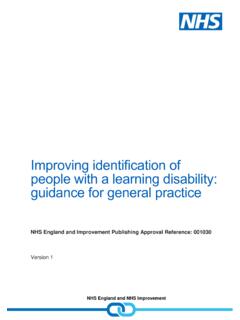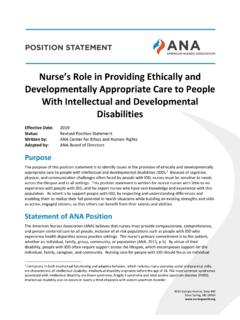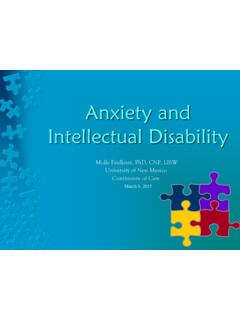Transcription of Intellectual Disability - Cara
1 Intellectual Disability This factsheet has been developed in consultation with key agencies with experience and knowledge in the specific areas. The information is provided for guidance only, allowing you to be more informed in your approach to being a more inclusive coach. No two people are the same, as such, please ensure your first step is to speak to the person understand their abilities and goals and never assume. What is an Intellectual Disability ? The World Health Organisation (WHO) defines Intellectual Disability as the significantly reduced ability to understand new or complex information and to learn and apply new skills (impaired intelligence). This results in a reduced ability to cope ind pendently (impaired social functioning), and begins before adulthood, with a lasting effect on development.. According to the American Association of Intellectual and Developmental Disabilities, an individual is said to have an Intellectual Disability if he/she meets the following criteria: 1.
2 IQ is below 70-75. 2. There are significant limitations in two or more adaptive areas (skills that are needed to live, work, and play in the community, such as communication or self-care). 3. The condition manifests itself before the age of 18. SP RT IREANN. SPORT IRELAND. Intellectual Disability How is Intellectual Disability classified? The World Health Organisation classification of Intellectual Disability is based on an individual's IQ and is as follows: 85 - 100+ Normal 70 - 84 Borderline normal 50 - 69 General Intellectual Disability 35 - 49 Moderate Intellectual Disability 20 - 34 Severe Intellectual Disability Up to 19 Profound Intellectual Disability Types of Intellectual Disability There are a wide range of types of Intellectual disabilities such as: Fragile X Syndrome, Down Syndrome, Williams Syndrome, Fetal Alcohol Syndrome, Prader-Willi and untreated Phenylketonuria (PKU). It is important to note that conditions such as Autism and Asperger's Syndrome are a spectrum.
3 This means that some people who have one of these conditions may or may not have an Intellectual Disability . It will depend where on the spectrum that they sit. General characteristics of Intellectual Disability people with an Intellectual Disability tend to take longer to learn and may need support to develop new skills, understand complex information, and interact with other people . The level of support an individual needs depends on specific factors. For example, a person with a mild Intellectual Disability may only need support with simple tasks such as joining a sports club. However, someone with a severe or profound Intellectual Disability may need full-time care and support with every aspect of their life they may also have physical disabilities. Some other general characteristics of people with an Intellectual Disability may include: Muscle laxity Hypermobility at the joints Attention may wander SP RT IREANN. SPORT IRELAND. Intellectual Disability Atlantoaxial instability people with Down syndrome are more prone to neck instability, called Atlantoaxial Instability.
4 Approximately 15% of people with Down syndrome, over their lifetime, will develop this neck instability. It is important for a coach to make themselves aware if a participant has this and make the required adaptations to their session and activities to avoid injury. Special Olympics requires that the athlete must have a full radiological examination, establishing the absence of Atlantoaxial Instability before he/she may participate in sports or events, which by their nature, may result in hyperextension, radical flexion, or direct pressure on the neck or upper spine. The sports and events for which such a radiological examination is required are: equestrian sports, artistic gymnastics, diving, pentathlon, butterfly stroke, diving starts in swimming, high jump, alpine skiing, squat lift, football, and any warm-ups placing undue stress on the head and neck. Intellectual Disability or Learning Difficulty? Intellectual Disability is often confused with specific learning difficulties such as dyslexia, attention deficit hyperactivity disorder (ADHD) and autism.
5 Dyslexia Association of Ireland describe dyslexia as a learning difficulty' because, unlike Intellectual Disability , it does not affect intellect. It is important to remember that, with the right support, most people with an Intellectual Disability in Ireland can lead independent lives. Sport provides invaluable life skills and social contact, as long as a positive and informed environment is available to people . SP RT IREANN. SPORT IRELAND. Intellectual Disability How to include people with an Intellectual Disability in your coaching sessions The level of support may vary pending the ability level The level of support may vary from person to person Use a range of coaching styles, including lots of visual demonstrations and visual cues Praise when success is achieved, encourage when not B. uild routine and familiarity into your sessions P. lan and allow for additional time to offer support G. ive clear concise instructions and repeat them frequently D. emonstrate specific coaching drills one element at a time, and build up slowly Use trigger words to condense instruction O.
6 Nly speak to parent/carer if person is unable to communicate W. here relevant, provide accessible and easy-to read information, and consider other non-verbal communication techniques W. here applicable pair up your participant with a supportive fellow participant who has the ability to explain concepts clearly, concisely, and patiently For further information and support, please visit: This factsheet resource was funded by the following: SP RT IREANN. SPORT IRELAND.







